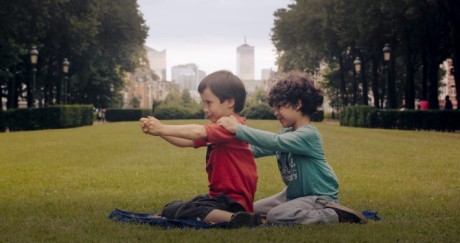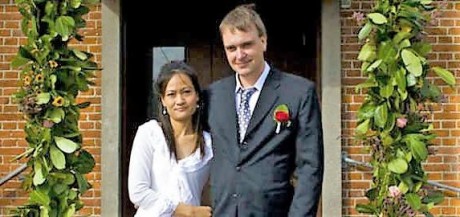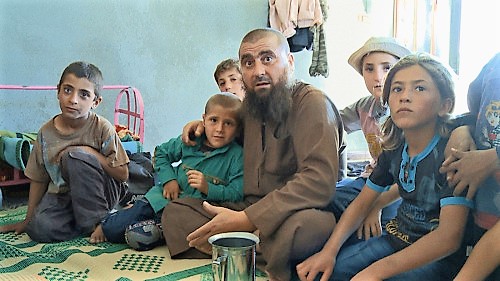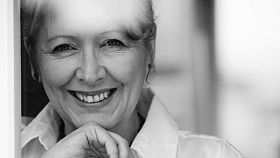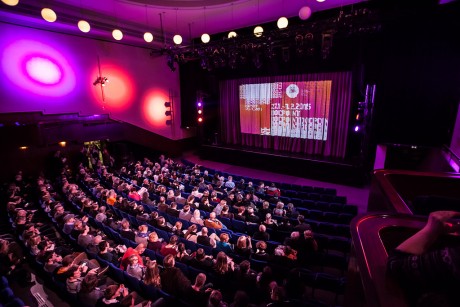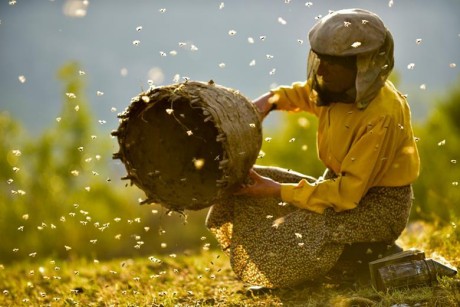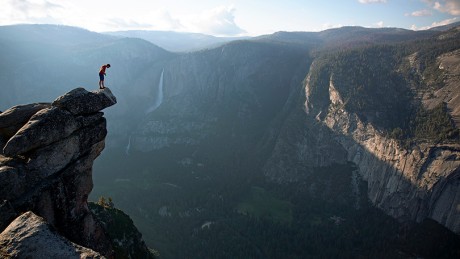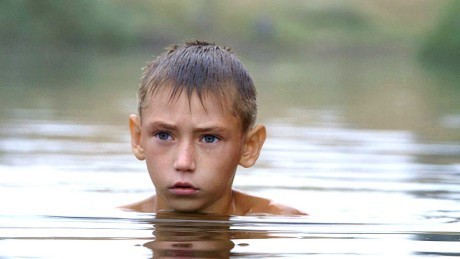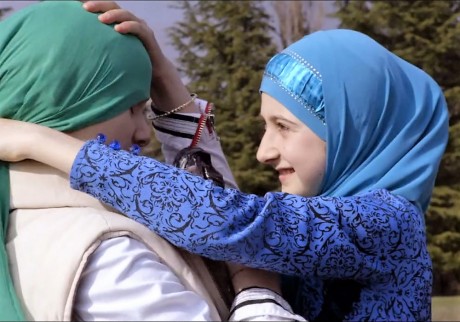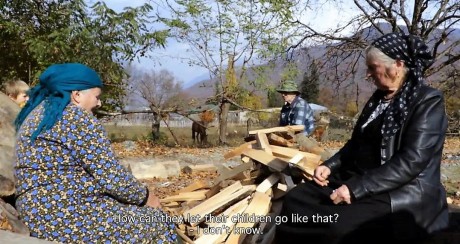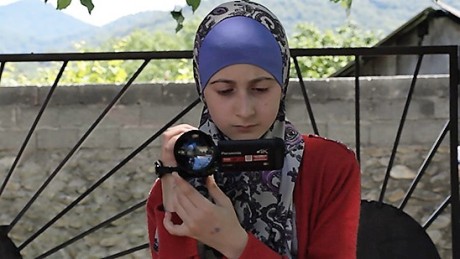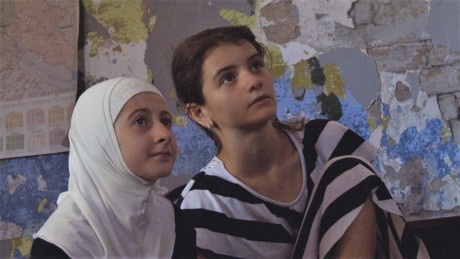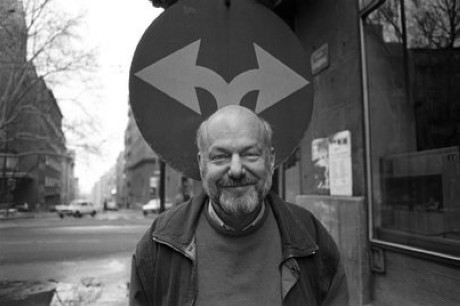DOCS & TALKS 2019 / CINEMATEKET 06/02 17:30
Stedet introduceres i smukt fotografi, Lars Skree og Henrik Bohn Ipsen er fotograferne. Der er myndighed over disse billeder. Et jysk landskab, som er meget, meget mere end et vindblæst hjørne af Danmark. Det er en egn og en befolkning med en særegen livsstil og en stor værdighed og en bevaret integritet, bekræfter fotografiet for mit blik, som er dannet tilbage i romantikken. Og kvinden, det til en begyndelse handler om, introduceres tilsvarende smukt og sikkert. Hun er egentlig fremmed her, men er så integreret, som det har været mulig at blive her, når man ser anderledes ud og er fra den anden side af Jorden…
Sådan skrev jeg i 2008, da jeg havde set de første afsnit af dette store filmværk. Og sådan ser jeg også det afsnit som nu har premiere på onsdag den 19. september, ti år senere, Hjertelandet. For netop sådan begynder denne nye dokumentarfilm, den anvender så smukt og berettiget de første to dele til i en ny sikker klipning at fortælle dette vigtige tilbageblik, præcis som jeg selv forinden havde været nødt til at se filmene fra dengang og finde frem, hvad jeg skrev om dem. Og det fortsætter jeg så med her.
For her, fra dokumentarværkets begyndelse i del 1, Fra Thailand til Thy begynder fortællingen, og det er som det skal være, jeg er tryg. Og jeg skal bestemt nok blive ved den fortælling fra første begyndelse, det mærkede jeg dengang og det mærker jeg nu. For der er jo i den fortælling en ægte historie, en kærlighedshistorie, som fortsætter i del 2, Fra Thy til Thailandog den historie finder nu sin foreløbige afslutning i en del 3, som er den aktuelle film Hjertelandet.
FØLELSERNES FORVANDLING
Kvinden skal formidle et ægteskab. Det har hun gjort før, fundet kvinder hjemme i sin landsby og placeret dem hos mænd her. De holder sammen, og vi lærer to af dem at kende. Hun har nu igen disse tre måneder til det, et turistvisums afmålte tid. Og personen, en søsterdatter, som det nu gælder, ankommer og kastes befippet ud i det. Kontaktannonce, svar, udvælgelse, mødet med manden. Han hedder Kjeld. Han er rar og genert. Hjælperne tager af sted, hun står fortabt i entrédøren til Kjelds hus, den første virkelig gribende scene. Hvordan skal det gå? Med denne unge kvinde, Kae hedder hun.
Det er godt nok tv-dokumentar, men det ser ikke ud som journalistik. Det er en elementær fortælling, som jeg vil kende fortsættelsen af og den foreløbige slutning på, bliver den lykkelig? Dog der er en slags pligtstof, noget jeg skal forstå, og fortællingen foregår ligesom inde i en socialantropologisk undersøgelse. Men det er et studium af et særligt og varmt miljø og i et storslået landskab. En anden mand valgte sin kæreste på samme måde, og nøgternt fortæller han, det var “ikke kærlighed, men jeg syntes, hun var pæn…” ”Pæn” siger han! Så præcist kan det siges på vores sprog. Det folkelige dansk, som dokumentaren i et særligt sprogplot også skildrer. Egnens dialekt er intakt, og de fremmede kvinder taler den på deres egen tydelige måde, som en understregning af dens egenart.
Hen mod første films slutning forstod jeg, at det på det formelle plan er et etnografisk projekt, et case study om dette udsøgt særligt arrangerede ægteskab. Men fortællingen inden i dette stykke videnskabelige feltarbejde hentes omhyggeligt frem af klipperen Marion Tour, og den vokser i intensitet i overensstemt takt med følelsernes forvandling hos de to. Det bliver bare smukkere og smukkere. Og selvfølgelig rives jeg med… Titlen på dokumentarfilmen er da også inde i mit hoved Historien om da Kae fik Kjeld…
MAN KAN IKKE VIDE ALT
Den histories foreløbige højdepunkt indtræffer i åbningen af film 2 Fra Thy til Thailand. Det sker så filmisk beslutsomt, at afsnittet må finde plads blandt filmhistoriens mange berømte bryllupper, en plads blandt de mærkværdigste. Men smukt er det i sin stiliserede distance og præcise forkortning. Her forener dette afsnits klipper, Marion Tour umærkeligt de to films parallelle ambitioner, socialantropologens og filminstruktørens, den rationelle forklaring og den sentimentale bevægelse. Filminstruktøren Janus Metz har som jeg ved nu hele vejen igennem det tredelte projekt arbejdet sammen med etnografen Sine Plambech, og det er interessant at mærke graden af sammensmeltning af videnskabelig og filmisk metode og evne til forståelse.
Brylluppet afløstes af adskillelse, visumperioden var løbet ud, Kae måtte rejse. Og jeg fornemmede, at dette ikke ville gå godt. Det fortælles af Kjeld, som i en verbumbøjning i et elegant indklip røbede et flash-forward, hvor han vurderede de få dage efter brylluppet som de rigeste i sit liv. Det vil altså snart gå galt, tænkte jeg. Dengang. Scenerne står der stadig, længe, det er mest scenerne, der fortæller, også det, ofte er de uden dialog, tonen er overalt stilfærdig, de indre monologer ligeså.
Men da de alle sammen så med hver deres alvorlige opgave tager ud til Kae i kvindernes fjerne landsby, tager det videnskabelige projekt over. Vi ankommer til landet og til den lille by. Vi er nu på feltarbejde og deltager i en række arrangerede og instruerede samvær, som emne for emne afdækker dette samfunds økonomiske og moralske situation. Og nu kan jeg godt glemme det romantisk dannede blik og det der med kærligheden. Her er det faktualiteterne, det gælder. Lars Skrees fotografiske linje fortsætter imidlertid ubrudt, Marion Tour beretter fortsat i hele scener, og da den nødvendige journalistik må underordnes disse greb (med korte reportage-ekskurser, en til storbyen og barerne og kulturen der og en med en pinagtig forhandling med en barnefader og eksmand, et dramahøjdepunkt..) bliver jeg med voksende uro (hvad med Kae og Kjeld i alle disse sidehistorier?) underlagt klipperytmens ubønhørlige skrue af ro, dens hvilen i scenen til sekundet før den dør, vemodet bag de sjældne smil. (Hvad tænkte mon Kjeld på under denne bryllupsrejse?)
Filmen forklarer en mængde forhold, de omhyggeligt skildrede scener viser endnu mere, og neddæmpetheden og rytmens tøven fortæller mig, at filmene godt ved, at vi ikke får alt at vide. Man kan nemlig ikke vide alt. Hvad siges der også i disse kvinders korte sætninger med lange tavsheder, hvad foregik der egentlig bag Kaes bedrøvede blik? Kjeld var ved at finde ud af det.
FOTOSESSION OG FILMOPTAGELSE
Lad mig fra nu del 3, Hjertelandet som umærkeligt tager fortællingen op (dog, der er gået ti år, det ses og mærkes på de medvirkende så smukt) nævne blot én scene ud af de mange, måske dem alle, som er lykkedes, i den grad lykkedes. For mig blot pludselig som ung mand at være til stede blandt unge mennesker i en hændelse med den unge kvinde (en slægtning til Kae) som vil fotograferes, fordi hun vil bruge det til en kontaktannonce som den erfarne slægtning fra Thy på besøg hos familien i landsbyen i Thailand skal lave der i lokalavisen i den danske by selv om hun har fået at vide, at hun er for ung, mindst et år for ung til at få opholdstilladelse der. Hun kan ikke vente, hun stiger bagpå en af vennernes scooter og de kører til nogle andre venner som har kamera og atelier og setup udstyr og hun forstår at posere på denne helt særlige internatonalt unge måde selvfølgelig fuldstændig bevidst om at hun både er model i en fotosession og skuespiller i en film og alt er iscenesat og autentisk dokumentar og Marion Tour klipper scenen præcist så veloplagt som den unge kvinde og så langsomt hurtigt, at det tager længere tid end scenen at læse, hvad jeg her har prøver at skrive om min erindring af den.
Reportagen og iscenesættelsen og interviewene er således så diskret og præcist og elegant fotograferet og optagelserne så indforstået og følsomt klippet, at min opmærksomhed helt fjernes fra det tekniske. Der sker nemlig det vidunderlige at jeg umærkeligt kommer til stede i samværet som skildres, faktisk, ved kameraet vel, er på besøg hos disse familier, til stede i filmens verden, ikke observerende, men seende og forstående alt. Ikke som antropolog, distanceret, men som gæst mere og mere, uden at rationalisere, men glad og fortvivlet. Aldrig vred, men ofte bekymret.
MENNESKER I GANG MED AT LAVE FILM
Det store, mere og mere insisterende og dermed gribende filmværk er ikke med dagens premierefilm Hjertelandet afsluttet. Det vil hvad enten det filmes og produceres som film eller ej fortsætte. For godt nok er det som jeg oplever iscenesatte og konstruerede dokumentarfilm, men de er så indgroede i den virkelige virkelighed foran kameraerne, disse menneskers, familiers, samfunds liv, at det er umuligt at skille ad. Det viser de allerede mange foromtaler og kommentarer også så tydeligt. Meget tydeligt. Det er altså autentisk dokumentarfilm jeg ser og hører og fornemmer. En skildring af en gruppe mennesker i gang med at lave film, i intenst arbejde med at skildre deres liv, tilværelse, handlinger og tanker om dette i en konsekvent usynlig iscenesættelse. Det er det bedste jeg kan sige om Janus Metz og Sine Plambechs ustandseligt farverigt tankevækkende dokumentarfilm præstation. Og jeg kan ikke opleve de tre film som andet end ét værk, og det må det fortsætte med at være, fortsættelse efter fortsættelse på den ene eller anden eller anden eller begge måder, sammen eller hver for sig. Metz og Plambech kunne måske, men kan nok ikke, lægge det fra sig nu. Men da de har sørget for, at fortællingen Hjertelandet / Heartbound egentlig ikke er deres alene – ja, så vil den under alle omstændigheder fortsætte…
IKONISK STILL
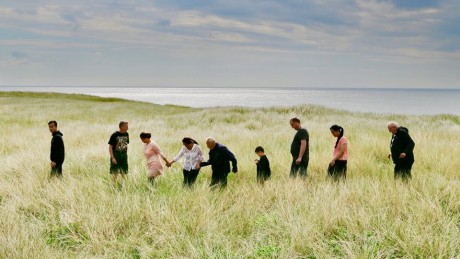
Christian Vium: The cast together, plakatfoto til Metz’ og Plambechs Hjertelandet, 2018. Filmens familie går med livet foran tur i klitten.
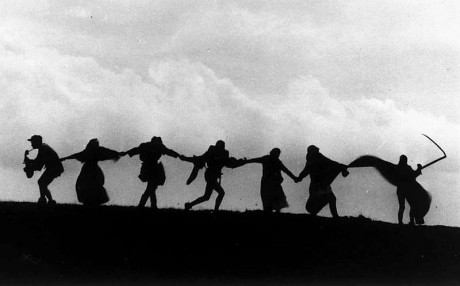
Gunnar Fischer, foto: Slutscenen i Bergmans Det syvende segl, 1956. Ridderen , hans væbner og hele hans husstand, altså filmfamilien danser med døden i bakkerne.
SYNOPSIS
Hjertelandet (Heartbound) is a unique longitudinal study of a network of Thai/Danish marriages shot over ten years. It is an exploration of globalization over time set on the intimate stage of marriage and family.
The film follows four couples and their children and documents how their lives develop as a consequence of the economic and emotional bonds that tie them together. It is an ensemble piece and an epic family drama set in two outskirt communities at either side of the global divide – yet intimately connected through marriage migration.
Through its dynamic time span the film traces how the women’s migration and their efforts to help their families affect their children many years down the line. Simultaneously it looks at the ways in which men from a remote region in Northern Denmark try to adopt the great big world to their safe and well-known quarters.
’Heartbound’ is a film about our shared human needs for love, dignity and money – even if our cultural interpretation of these needs may differ. It’s a film about people who try to change their lives when choices are few, and a film that explores the consequences of these life choices not only for the men and the women who make them, but also for the children who have to live on with them.
In this way, ‘Heartbound’ ties together migration and integration over a unique time perspective and discusses one of the greatest movements and challenges of our time: The increasing flow across borders of people, money and ideas in our global sharing of the present. (Magic Hour Films and Metz Film)
EVENT
ONS 06/02 17:30 FORSKNING & FILM / HJERTELANDET / Janus Metz, Sine Plambech, 2018 / 90 min. / 145 min. inkl. debat.
Få et indblik i, hvordan antropologisk feltarbejde og migrationsforskning forvandles til en prisvindende dokumentarfilm. Gennem ti år har filmskaberne Janus Metz og DIIS-seniorforsker Sine Plambech fulgt en håndfuld familier, som gennem arrangerede ægteskaber binder to perifere områder i Danmark og Thailand tæt sammen. Det er blevet til filmen ‘Hjertelandet’, en alternativ kærligheds- og migrationshistorie. Filmen havde danmarkspremiere i efteråret 2018 og har siden rejst verden rundt på festivaler.
LINKS
https://www.dfi.dk/cinemateket/biograf/filmserier/serie/docs-talks-2019
(program og billetter)
http://www.magichourfilms.dk/heartbound
(Production company: Heartbound / Hjertelandet, 2018)
https://filmcentralen.dk/grundskolen/film/fra-thy-til-thailand
(Streaming af Fra Thy til Thailand, 2008)
Filmstriben Fra Thailand til Thy
(Streaming af Fra Thailand til Thy, 2007)



